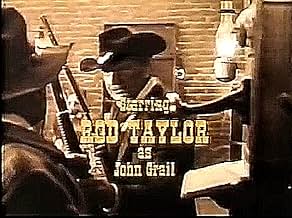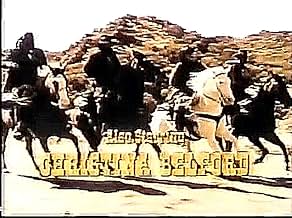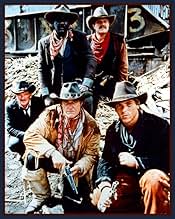Five cowboys are sent forward in time from 1899 to 1986, where they start their own detective agency.Five cowboys are sent forward in time from 1899 to 1986, where they start their own detective agency.Five cowboys are sent forward in time from 1899 to 1986, where they start their own detective agency.
Browse episodes
Storyline
Did you know
- ConnectionsFollowed by Outlaws: Outlaws (1986)
Featured review
The TV movie 'Outlaws' and its ensuing TV series are an interesting example of how a good idea for a one-off story can't always be sustained as an ongoing series.
The TV movie kicked off in the Old West, in 1886 ... actually rather late for the Old West, since most of the legendary desperadoes had died or retired by this point. Lawman John Grail is trying to arrest four tough hombres, not worried about the fact that he's outnumbered. Suddenly a weirdly glowing blue ring drops out of the sky and envelops the five men and their horses. Next thing they know, they've travelled into the future precisely one hundred years. (Which ought to tip off the audience that the time-hole is somebody's invention, not a fluke of nature.) None of these men have criminal records in the year 1986, so Grail -- with surprising ease -- convinces them to become crime-fighters.
As I say, an interesting idea for a one-off. Over the course of a weekly series, this idea became difficult to sustain. None of these men have Social Security numbers or other I.D. in the year 1986. How are they going to earn a living, much less find a place to stable their horses? What happens when they run out of bullets for their 19th-century firearms? It would be more plausible if all of them -- including honest Grail -- became criminals in the modern era, as they've got to eat, and they have no way to earn a living honestly.
In its brief run, 'Outlaws' managed to get considerable mileage out of the 'fish out of water' theme. Richard Roundtree was authoritative and plausible as 'Ice', the most cold-blooded of the bandits. Rod Taylor, alas, was more plausible when he was fighting Morlocks and Tippi Hedren. There was some extremely annoying dialogue, not least the steady anachronisms in the speechifying of these 19th-century varmints who sounded like they'd been raised in the late 20th century. There was also a *really* annoying mantra which the bandits implausibly recited, exactly the same way every time, whenever they began a new adventure.
I must disagree with a previous IMDb poster who said that the Outlaws never attempted to return to their own time. In one episode, an outlaw snatched a lightning-rod and rode his horse back and forth in a thunderstorm, goading the lightning to strike him ... and either kill him or return him to his own time. That was the single most believable scene in 'Outlaws'.
Annoyingly, we never do get any explanation for the time-hole, nor who sent it, nor why. It was clearly just a dramatic device to put these hombres into our modern age.
The TV movie kicked off in the Old West, in 1886 ... actually rather late for the Old West, since most of the legendary desperadoes had died or retired by this point. Lawman John Grail is trying to arrest four tough hombres, not worried about the fact that he's outnumbered. Suddenly a weirdly glowing blue ring drops out of the sky and envelops the five men and their horses. Next thing they know, they've travelled into the future precisely one hundred years. (Which ought to tip off the audience that the time-hole is somebody's invention, not a fluke of nature.) None of these men have criminal records in the year 1986, so Grail -- with surprising ease -- convinces them to become crime-fighters.
As I say, an interesting idea for a one-off. Over the course of a weekly series, this idea became difficult to sustain. None of these men have Social Security numbers or other I.D. in the year 1986. How are they going to earn a living, much less find a place to stable their horses? What happens when they run out of bullets for their 19th-century firearms? It would be more plausible if all of them -- including honest Grail -- became criminals in the modern era, as they've got to eat, and they have no way to earn a living honestly.
In its brief run, 'Outlaws' managed to get considerable mileage out of the 'fish out of water' theme. Richard Roundtree was authoritative and plausible as 'Ice', the most cold-blooded of the bandits. Rod Taylor, alas, was more plausible when he was fighting Morlocks and Tippi Hedren. There was some extremely annoying dialogue, not least the steady anachronisms in the speechifying of these 19th-century varmints who sounded like they'd been raised in the late 20th century. There was also a *really* annoying mantra which the bandits implausibly recited, exactly the same way every time, whenever they began a new adventure.
I must disagree with a previous IMDb poster who said that the Outlaws never attempted to return to their own time. In one episode, an outlaw snatched a lightning-rod and rode his horse back and forth in a thunderstorm, goading the lightning to strike him ... and either kill him or return him to his own time. That was the single most believable scene in 'Outlaws'.
Annoyingly, we never do get any explanation for the time-hole, nor who sent it, nor why. It was clearly just a dramatic device to put these hombres into our modern age.
- F Gwynplaine MacIntyre
- Feb 10, 2005
- Permalink
- How many seasons does Outlaws have?Powered by Alexa
Details
- Release date
- Country of origin
- Language
- Also known as
- Más allá de la ley
- Production companies
- See more company credits at IMDbPro
- Runtime1 hour
- Sound mix
- Aspect ratio
- 1.33 : 1
Contribute to this page
Suggest an edit or add missing content


































